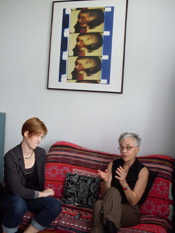 |
||||
Filmmaker Barbara Hammer and Films for the Feminist Classroom Founding Editor Deanna Utroske in Hammer’s studio. (Photo by Agatha Beins). |
||||
Journal Issue 2.supplement
Summer 2010
Edited by Deanna Utroske, Agatha Beins, Karen Alexander, Julie Ann Salthouse, and Jillian Hernandez
Managing Editor: Katherine O’Connor
An Interview with Barbara Hammer
By Deanna Utroske and the Films for the Feminist Classroom editorial collective
Page 3
Utroske: How did the opportunity for your upcoming retrospective at the Museum of Modern Art (MoMA) materialize? And could you talk about what preparations have gone into this project?
Hammer: Well, I received a large grant from Creative Capital and made the film Resisting Paradigms (2003) about resistors during World War Two; they happen to all be women from the South of France. Creative Capital and I formed a long-term relationship, as they do with their artists. Even though the film was completed in 2003 I continued to work with them as a strategic planner. Strategic planning means you think about your time schedule, you think about what you want from something, and you make goals—one-year goals, five-year goals. You write your obituary so that by the time you do die you’ve been able to complete everything you wanted. I teach artists how to do this.
So I was very primed for wanting a retrospective of my work. And one Saturday night we had a screening at MoMA that introduced Maya Deren in a retrospective way to the public. Maya Deren is the mother of avant-garde film. Su Friedrich, Carolee Schneemann, and I have all been influenced in our filmmaking by Maya Deren. We showed three films of ours along with Maya Deren’s first film.
Sally Berger, the curator of Maya Deren’s Legacy: Women and Experimental Film, invited me many times to come to the museum for a dialogue about Maya Deren. Maya Deren influenced me: I had studied her while I was in school, I wrote a paper on her, etc. I felt like I was giving my knowledge away. Finally, one day I said, “You know what I really want?” And she said, “No, what?” And I said, “A retrospective.” She replied, “Well, I’ll take it to the films committee.” And then in about a week or two she came back and said, “They’re all for it.” Ask for what you want is the strategic plan. So many of us think we have to wait until we are asked. First I was embarrassed to say that I wanted a retrospective, but when I told the story other people were just so excited. It empowers us to think about what we want and to strategically plan how to get it.
September 15 is the opening night of my month-long retrospective of 15 different programs, each repeated. On October 4 I will give a talk called “The Hidden Hammer” about my lesser known performance, installation, and photography.
A retrospective involves a lot of watching films, planning, organizing, and then preparing with the most up-to-date media for exhibition. It has been a lot of work for the curator Sally Berger and for me as well. In that process, and along with the Maya Deren’s Legacy: Women and Experimental Film exhibition, the museum purchased about three or four films and videos of mine. There is also an artist fee that is provided, and the museum itself is paying for the restoration of several films as well as other film-related expenses. I am very happy with the arrangement and I’m very concerned about artists getting equal wages for their work.
Utroske: You’re also being compensated in exposure via a prestigious retrospective.
Hammer: I feel well compensated and I have the rent to pay! [Laughs] And the prestigious event happened because I’ve worked for forty years.
The organization Wages for Artists came up in conversation on my book tour. People in the audience would ask me what my feelings were about them. It is political. Artists aren’t paid; we’re professionals. And that’s pretty ridiculous, because we’re necessary for society.
Utroske: Right. I’m wondering about the mentorship you receive: If you’re looking for guidance or inspiration, who do you reach out to? What community do you turn to for support? Who mentors you now?
Hammer: [Laughs] Oh, my. Well, you know about Generations (Hammer and Carducci 2010) the film I’m working on now with Gina Carducci that’s about mentoring.
Who mentors me now? That’s a good question. Mostly I mentor myself, and in many ways I always have. But I have liked the work of Yvonne Rainer, Su Friedrich, and Maya Deren, of course. I looked at Meshes of the Afternoon (Deren 1942) the other day. I’ve seen it thirty times, and it’s still a new film every time I see it. So, work that I admire and respect mentors me.
In the Creative Capital world, the foundation supported by Andy Warhol money, Colleen Keegan has come to me as a strategic planner. Her training was with corporations. She has worked with MTV and with banks, teaching professional people how to strategically plan their lives. And she realized artists didn’t know how to do this. So she’s trained us, and now we go out and train others. I think I’m always learning in terms of professionalism. If there’s ever a really tough question, I’ll give her a call. It’s not about making art, but it’s about living my life as a professional artist.
Copyright © 2014. All rights reserved.